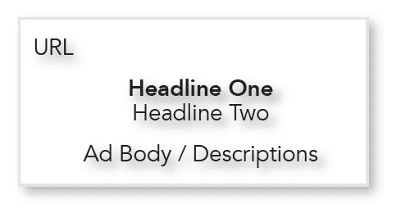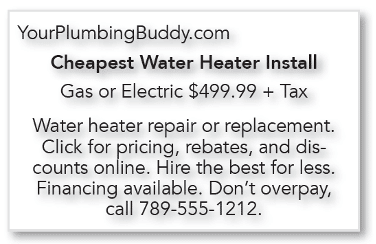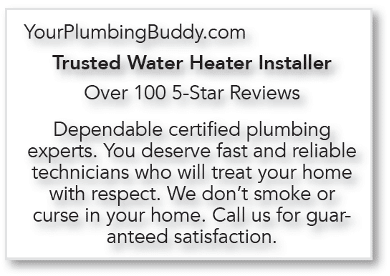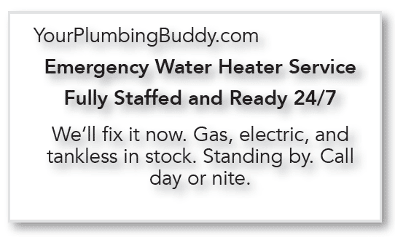
There’s a saying that “Business goes where it’s invited.” What should we put in our ads to get that invitation from Ms. Homeowner? We’ll speak in terms that resonate with her.
Chuck McKay
Selling something is the whole purpose of being in business. It’s also the purpose of advertising.
And no matter which medium you choose to carry your invitation, you can calculate advertising effectiveness with a very simple metric: Was there an increase in sales following your ad campaign?
Divide the increase by the number of dollars you spent advertising.

This is your Return On Advertising Investment.
Experience has taught us that sometimes there is no sales lift (increase). Dividing zero by your expenditures provides zero ROAI.
Ouch. That hurts.
You’ve no doubt been told mass media advertising costs too much. That it is inefficient, reaching people who aren’t in the market for what you sell. That online advertising is easily trackable. And with online you only pay for results!
That leads us to ask, what constitutes a result?
- Is someone “liking” our Facebook ad a result?
- Is someone opening our email a result?
- What about online display “impressions?”
- Or someone clicking on our PPC ad? Is that a result?
Clicking our ad typically takes Ms. Homeowner to our website. In roughly 3 seconds, just barely enough time to make a quick impression, she’ll decide whether she wants to spend any time on our site. If she thinks the answer she’s looking for could be here, she’ll start searching to find it.
Conversely, if she doesn’t immediately get that impression, she’ll click the back button. Three seconds after we’ve paid for the click she’s gone forever.
Likes, impressions, opens, and clicks are all steps to a possible sale. We can measure and tweak each step for maximum effectiveness. But remember the purpose of advertising is an increase in sales. Our goal is to provide potential customers a reason to choose our invitation to do business.
Make it Happen Now
Unless we’ve already established a strong identity, most homeowners think our company and the services we offer are interchangeable with those of our competitors.
- All electricians make current flow safely through wires.
- All plumbers clear drains and install faucets, water heaters, and toilets.
- All painters apply paint to walls and trim.
- All pest control companies spray for bugs and remove rodents.
- All foundation repair companies correct the settling of structures.
- All fencing contractors erect fences.
Understanding that business goes where it’s invited, we place some Google Text (pay-per-click) ads which show up on a search engine results page. There our ads will sit among all the ads from other contractors.
All of those ads will try to attract the attention of potential customers. Those customers need an electrician, a plumber, a painter, a pest control company, a foundation specialist, or a fencing contractor to solve an immediate problem. We need to make an instant impression before they make a purchase decision.
What Will We Say in Our Ads?
Let’s use Google Text Ads to illustrate the decisions we’ll have to make.
We’ll place the URL (the web page our ad resolves to when clicked) at the top of the page.
Then we use either 1 or 2 headlines of up to 30 characters each to draw attention and provide reasons to click. The headlines will be displayed one on top of the other, or side-by-side, or some combination, depending on the size of the space Google has available.

When the headlines are displayed all in a line, they are separated with a “pipe,” symbol, which is above the backslash key on your keyboard, and looks like this: |.

Ad Body / Descriptions can take up to 180 characters. We’ll reinforce the headline benefits by adding detail.
Now that we understand both formats, we’ll only show one in each of the following examples.
Your Plumbing Buddy
We can best illustrate how to create text ads by creating a fictitious company, YourPlumbingBuddy.com, and writing some ads for the sale and installation of a water heater. At the time of this writing YourPlumbingBuddy.com does not exist.
(If at some point in the future someone claims it, please remember that, though the author created YourPlumbingBuddy.com, he has no knowledge of, and does not endorse, that business.)
The very first decision we require is which homeowner to target.
Advertise to the Price Conscious
To catch the attention of the Price Conscious Homeowner we can offer “Cheapest install” and a specific low price. Other Price Conscious terms include “Bargain,” “Discount,” “Sale,” “Budget,” “Economical,” “Cost-Effective,” “Thrifty,” “Low-Cost,” “Reduced,” “Affordable,” “Inexpensive,” “Slashed,” or “Competitive.”

Advertise to the Urgent
To appeal to the Urgent Homeowner we’ll use headlines promising “Emergency Service” and “Ready 24/7.” Other Urgent appeals for use in the Ad Body might include such terms as “Same Day,” “Tonight,” “Disaster,” “Accident,” or “Problem,” “Quick,” “Fast,” “Flash,” or “Pronto.”
Advertise to the Value Conscious
When it comes to catching and holding the attention of the Value Conscious Homeowner let’s talk about “trust” and use strong social proof in the form of “Over 100 5-Star reviews.” Other Value Conscious terms might include “Quality,” “Guaranteed,” “Dependable,” “Truth,” “Benefit,” “Excellence,” “Caliber,” “Superior,” “Good,” “Safe,” “Code,” “Ethics,” “Standards,” or “Principles.”
Homeowners shopping for value may also appreciate options, such as “Gas, Electric, or Tankless.” “Repair or Replace,” or “Energy Efficient.”

Please note: regardless of which homeowner group we’re targeting, we include a specific call to action in each ad. “Call day or nite.” “Don’t overpay, call 789-555-1212.” “Call us for guaranteed satisfaction.”
How Much Do Pay Per Click Ads Cost?
Every ad campaign, and each ad in that campaign, is priced differently. Why?
We’re bidding at auction for our ad to appear when a homeowner enters “keywords” into the search bar. “Plumbers” is relatively expensive keyword because everyone wants to be listed each time a homeowner needs plumbing help, and will try to outbid each other for its use.
“Plumbers in Minneapolis” is less expensive, because we’ve just eliminated people searching in St. Cloud, Eau Claire, Rochester, Owatonna, and Mankato. Size of market matters. There’s less demand for every keyword in Kingman, Arizona than there is for the same keywords in Seattle.
The least expensive keyword is our own name. And that stands to reason, doesn’t it? Who else will bid for homeowner clicks looking specifically for us? (There is a case to be made for having an ad resolve to your website when someone thinks they’re contacting your competitor, but in general I advise against it.)
Ad Quality
But, it’s not just what we’re willing to pay that determines ad placement. Google determines how much money they’ll make from all of the contractors bidding, and develops a “quality score.” The higher quality ads do a better job of helping the homeowner find what she’s searching for.
Let’s say Google determines our quality score is 10. If we bid $5.00 for a particular keyword Google ranks our bid at 50 (10 x $5.00). Another contractor with a quality score of 8, also bidding $5.00 will rank 40, and Google will place our ad on the search engine results page before they place his. This usually means searchers are more likely to see our ad because it will be placed higher on the page.
But suppose someone with awful ads is willing to pay even more?
Perhaps another contractor doesn’t follow our strategy of speaking directly to Urgent, or Price Sensitive, or Value Conscious homeowners. Because he’s not focused on a particular customer group Google has awarded his ads a quality score of 5. He’ll have to bid $10.01 to rank 50.05 and “win” the bid. Effectively he’s saying, “Hey, Google, don’t give the homeowner the answer they’re searching for. Let me pay more so you can give them my answer instead.”
But there’s an even bigger reason that PPC ad rates are climbing at an ever accelerating rate.
We’re no longer just competing just with other contractors.
The Aggregators
Ever bought a lead from Angi, or Yelp? How about Thumbtack? The Better Business Bureau? HomeGuide?
These folks are aggregators. They outbid us on all of the keywords, get the leads, then sell those leads back to us. We’re not only competing with other local contractors, but also against Yellow Pages, Contractor Quotes, Home Depot, Networx, and Top Rated Local.
HomeAdvisor is ranked on 2,000,000 (yes, TWO MILLION) keywords! They have 90,000 authoritative domains like Forbes and Google linking back to them.
We’re losing on local page ranking (free organic listings) because of the aggregators. Then, they’re outbidding us on pay per click industry specific keywords.
And that’s still not the worst part of buying text ads.
Residual Benefit
The worst part about sinking marketing money into Google Text ads is being invisible to those tens of thousands of homeowners who weren’t looking for water heater help today.
Tomorrow, when other water heaters spring leaks or stop heating, those homeowners will have to start their search from scratch.
This is why my partners and I tell home services contractors that they need some mass media promotion… radio, television, newspapers, billboards, magazines. Companies that are more easily recognized sell more services.
Mass media advertising helps us shape public opinion and influence customer behavior. Through radio, local TV, cable, outdoor/billboards, city magazines we not only sell water heaters today, we influence homeowners to choose us tomorrow as well. And next year.
No matter what the economy, air conditioners will still break down on the hottest days. Furnaces will fail on the coldest. Roofs will leak when it rains. Toilets will clog every day. But now that our name is the one homeowners recognize and remember, we automatically get a greater share of that business. Empirical data demonstrates homeowners are much more likely to select a contractor they have heard of over one they have not.
Good mass media campaigns keep working better the longer we use them. They make the difference between people who can’t remember us, and those who can’t forget.
Mass media ads make our pay per click work better, too. Homeowners see our name in search results and say, “Hey, I’ve heard of these guys! Let’s call them.”
Now that you know that the words you choose will help Ms. Homeowner to understand what you offer, and how digital ads are priced, let’s talk uniqueness in Part 6.
__________
The content for this series of posts was taken from Chuck McKay’s The Personality Prescription for Contractors, available on Amazon.
Links to previous posts in this series:
Introduction
Part 3 – You’re Choosing Cheap Ones
Part 4 – Other Homeowners’ Motivations
- How Many Pancake Restaurants? - October 7, 2024
- Bringing Newcomers into the Labor Pool - January 4, 2023
- Hire Veterans Reentering the Local Job Market - December 28, 2022

